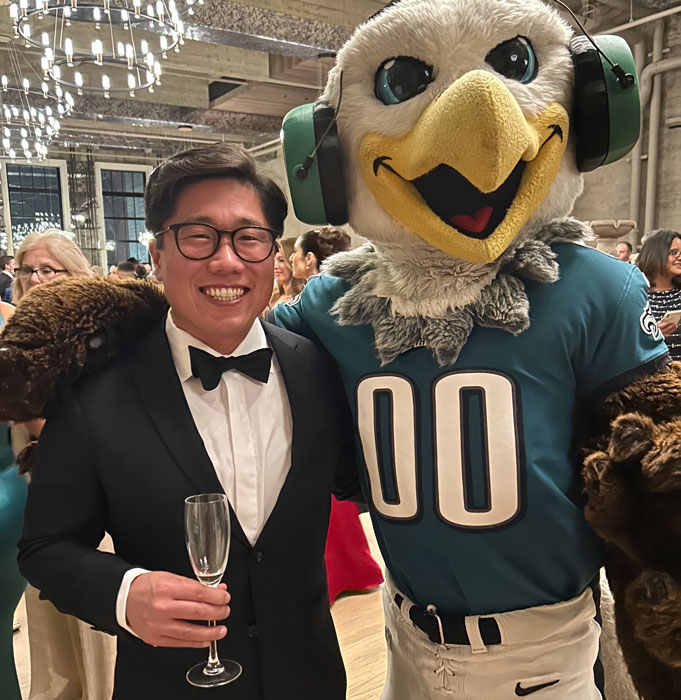Jason Yi '01: Research Soaring With the Eagles

Photo courtesy of WashU Medicine.
Former biochemistry & molecular biology major receives grant to study autism spectrum disorder from philanthropic arm of Philadelphia Eagles
Article reprinted with permission from WashU Medicine/Department of Neuroscience.
by Shea Stewart
Jason Yi '01, an assistant professor of neuroscience at WashU Medicine, has received a $400,000 pilot grant from the Eagles Autism Foundation to advance a new approach to treating autism spectrum disorder.
The nonprofit, which was established by Jeffrey Lurie, owner of the Super Bowl LIX-winning Philadelphia Eagles, is dedicated to raising funds for autism research and care programs.
For Yi, the award arrives with a dynamic edge—he’s a Philadelphia native and Eagles fan.
“I would be lying if I said this award didn’t feel exceptionally special to me,” Yi said. “I have a lot of great memories of watching the Eagles with my family and friends. When I received the notice of the award, I could almost feel my childhood self jumping with excitement in my chest.”
Yi’s project explores the engineering of synthetic proteins to treat autism spectrum disorder. The grant continues Yi’s focus on brain development and disease to uncover treatments for developmental disorders.
“The focus of the project is to develop new ways to inhibit UBE3A, an enzyme known as a ubiquitin ligase,” he said. “UBE3A is a housekeeping enzyme that identifies proteins that need to be discarded by hanging a little molecular tag on them called ubiquitin. Sometimes individuals are born with extra copies of the gene that encodes UBE3A, and this causes one of the most common genetic forms of autism. Developing inhibitors for UBE3A has been difficult, and our work takes a new approach to develop an inhibitor.”
The Yi Lab has extensive expertise in neurodevelopmental disorders, ubiquitin ligases and protein engineering, including UBE3A, one of 600 to 700 ubiquitin ligases encoded in the human genome — representing the largest family of enzymes in human cells.
Owing to their complex biochemistry, ubiquitin ligases are not druggable by traditional approaches. Yi’s work with UBE3A, including using gene therapy to introduce the inhibitor to cells, could unlock methods used beyond autism research.
“If successful, our work will demonstrate that we can target these enzymes for therapy using newly developed approaches,” Yi said. “Ubiquitin ligases are involved in every aspect of life and are implicated in virtually every human disorder. I think having a way to manipulate these enzymes using biologicals or drugs opens all sorts of possibilities for future treatments.”
Yi and his team plan to test their engineered UBE3A-suppressor in mouse models and fine-tune the system to control its effects.
Working closely with foundations
The work with the Eagles Autism Foundation demonstrates Yi’s approach to the disorders he studies goes beyond research. Earlier this year, Yi earned a 2025 Dean’s Impact Award “for his work with the Angelman Syndrome Foundation and his hands-on and compassionate approach with the disorder’s community.” Since 2021, Yi has served on the scientific advisory board of the Angelman Syndrome Foundation, an organization that supports research on this rare disorder.
Established in 2019, the Eagles Autism Foundation supports high-quality and impactful autism research and care to improve the lives of affected individuals and families now, while fostering the acquisition of knowledge, technologies and discoveries that will bring new, future opportunities.

Yi, an Eagles football fan, is pictured with the Eagles mascot, Swoop, at a gala event in Philadelphia. Photo courtesy of Jason Yi.
A 2001 graduate of Dickinson College in Carlisle, Pennsylvania, Yi later earned his PhD in pharmacology at Duke University in 2009. But his path to neuroscience and WashU Medicine was not always clear.
“I went to college without a clue what I wanted to study,” he said. “I liked biochemistry and molecular biology because I enjoyed how the two disciplines simplified life into a series of molecular interactions and reactions. Plus, being a biochemistry and molecular biology major got my parents to quit bugging me about how I was going to get into medical school.”
During a summer research experience at Fox Chase Cancer Center in Philadelphia, he was introduced to gene therapy and inspired.
“I was working on a mutant yeast strain that was struggling to proceed through cell division because of a defective gene,” he said. “When my advisor showed me that we could ‘rescue’ this defect by replacing the defective gene with a human copy, that was it, I was hooked. I worked at a drug discovery company before starting a PhD program in pharmacology. During my first year, I rotated through a neuroscience lab on a whim and was captivated by how the brain develops."
Now, his lab combines protein engineering, neuroscience and genetic research with the goal of developing real-world therapeutic solutions—a mission receiving a significant boost thanks to the Eagles Autism Foundation.
TAKE THE NEXT STEPS
Published June 10, 2025